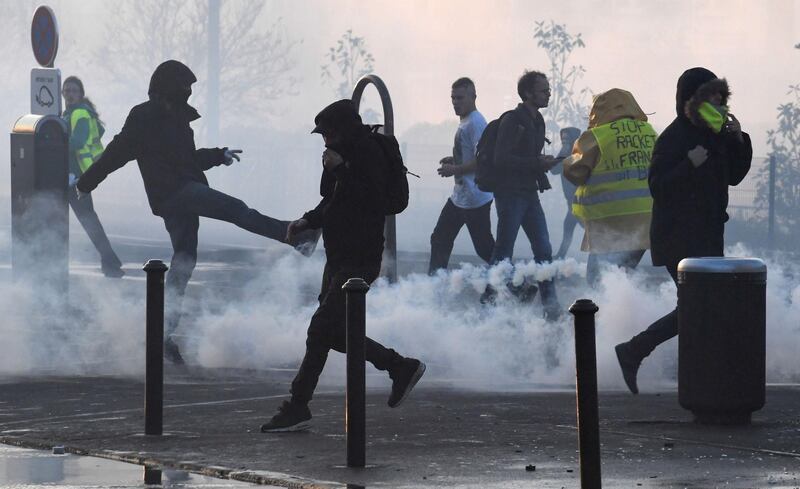France was shaken on Saturday by the biggest demonstrations since President Emmanuel Macron took office as police responded with tear gas against protesters who blocked traffic in a grassroots movement that coalesced around demands for lower fuel taxes.
Parisian traffic was jammed as more than 1,000 people marched in the centre of the capital, and one protester died in south-eastern France after being hit by a car whose driver panicked amid a road blockade. More than 2,000 rallies took place across the country, gathering more than 282,000 protesters, according to the government.
Interior Minister Christophe Castaner said 227 people were injured and dozens arrested amid stand-offs throughout the country between protesters who sought to block traffic and drivers. Demonstrators entered a government building in Troyes, in north-eastern France.
The day’s events place Mr Macron in a delicate position as he strives to take the heat out of a movement which has morphed from a demand to lower fuel taxes into a diffuse expression of anger against high unemployment and difficulties to make ends meet.
“Our level of concern is at maximal level,” Mr Castaner said on Saturday morning. He asked demonstrators to take measures to guarantee safety, saying that “the right to demonstrate is essential in this country and must be protected, but one must also ensure that the minimal organisation of this protest avoids a tragedy of this kind”.
__________________
Read more:
Macron's vision for French Islam may present him with his biggest challenge yet
Paris Peace Forum launches annual meeting to fight for multilateralism
__________________
Demonstrators interrupted traffic on the A13 motorway that links Paris to Normandy and blocked the A4 motorway near Metz in eastern France, according to toll-road operator Sanef. Traffic was also slowed down by many blockades on the A1 motorway north of the Roissy-Charles de Gaulle airport.
The government had said it wouldn’t bar any protests, but it wouldn’t allow any roads to be blocked. Mr Macron refused to back down on higher petrol taxes, which is part of a long-term goal of weaning France off fossil fuel.
The social-media-driven movement, which branded itself "gilets jaunes" - after the yellow high-visibility safety vests drivers need to keep in their cars - blames higher taxes on fossil fuels for rising prices at the pump. A petition on Change.org calling for lower fuel taxes gathered about 860,000 signatures. A website www.blocage17novembre.com listed plans for protests in all of France’s 95 mainland departments.
In the run-up to the protests, opposition parties tried to associate themselves with the movement.
Far-left party Unbowed France’s leader Jean-Luc Melenchon said the number of protesters was much higher than the interior ministry’s assessment and accused the government of "dramatising" the movement. Laurent Wauquiez, leader of conservative party The Republicans, took part in a protest in Puy-en-Velay, central France, urging Mr Macron to drop his plans to increases taxes.
"This government hasn't understood the anger of the French," Socialist Party secretary general Olivier Faure said in a statement on Wednesday. "We were the first party to express our total support for this movement," said nationalist leader Marine Le Pen in an interview on November 13 with Le Parisien newspaper.
Mr Macron said on Wednesday that he “hears the anger” but said he was “wary because many different people are trying to piggyback on this movement”. In earlier interviews, he has said he prefers taxing fuel to taxing labour.
The government increased fuel taxes this year and will add another 6.5 cents per litre to diesel and 2.9 cents per litre to petrol at the start of next year, as it tries to bring diesel and petrol taxes in line.
Diesel prices at the pump in France have risen 16 per cent this year to an average €1.48 (Dh6.2) a litre, according UFIP, the French oil industry federation. Petrol is up 5 per cent to €1.47 per litre.
France is trying to end its reliance on diesel, fuelled by decades of government support. Diesel once represented three-quarters of cars sold in France, but the proportion has declined below 40 per cent as it gradually lost its tax advantage. Contrary to its reputation for public transport, about 70 per cent of the French drive to work every day, according to state statistical unit Insee, compared with about 76 per cent in the US.






